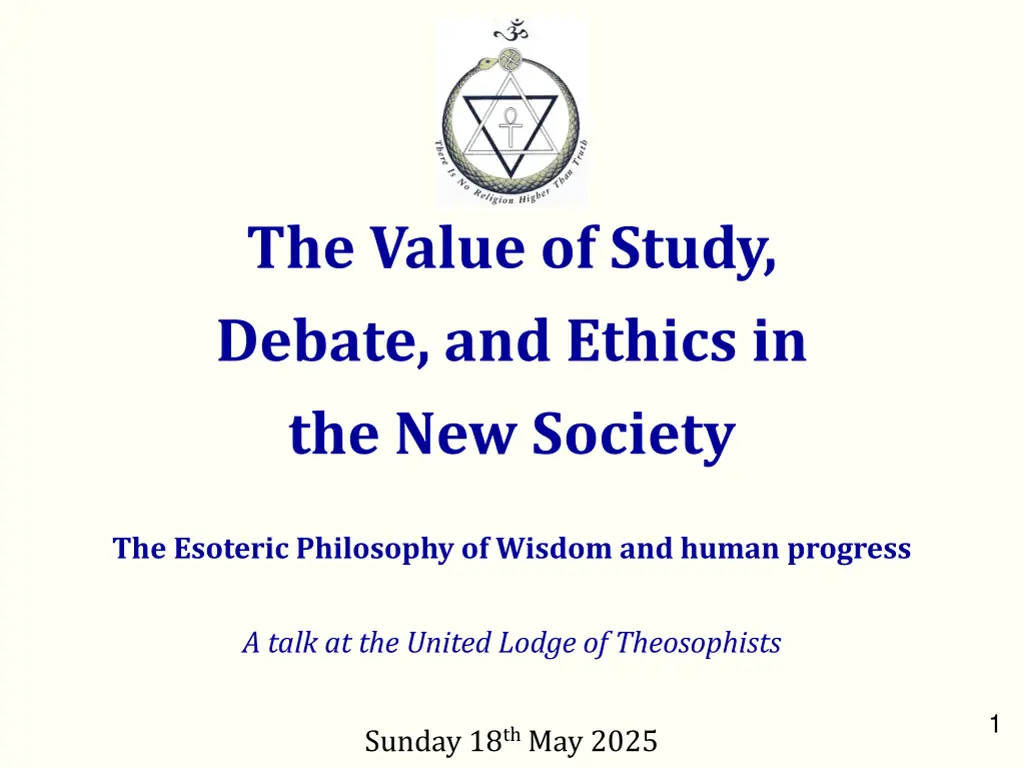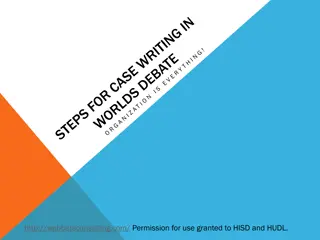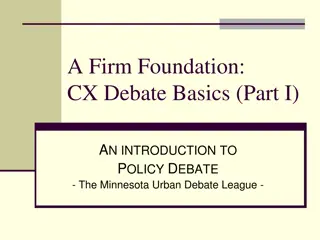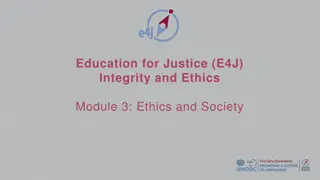
Exploring Esoteric Wisdom and Ethical Debates in the New Society
Delve into the esoteric philosophy of wisdom, human progress, and ethical debates in the new society as discussed in the United Lodge of Theosophists. Discover the value of study, debate, and ethics, along with insights from the Tao Te King and the practices of a bodhisattva mahasattva. Join this journey of learning and reflection towards higher states of being and understanding in the modern world.
Download Presentation

Please find below an Image/Link to download the presentation.
The content on the website is provided AS IS for your information and personal use only. It may not be sold, licensed, or shared on other websites without obtaining consent from the author. If you encounter any issues during the download, it is possible that the publisher has removed the file from their server.
You are allowed to download the files provided on this website for personal or commercial use, subject to the condition that they are used lawfully. All files are the property of their respective owners.
The content on the website is provided AS IS for your information and personal use only. It may not be sold, licensed, or shared on other websites without obtaining consent from the author.
E N D
Presentation Transcript
The Value of Study, Debate, and Ethics in the New Society The Esoteric Philosophy of Wisdom and human progress A talk at the United Lodge of Theosophists 1 Sunday 18th May 2025
The Tao Te King Paradox and a Balancing Poetic Meter the initial reading starts with two translations of the final summary chapter, no. 81 Sincere words are not sweet, Sweet words are not sincere. Good men are not argumentative, The argumentative are not good. True words aren t beautiful beautiful words aren t true the good aren t eloquent the eloquent aren t good the wise aren t learned the learned aren t wise the sage accumulates nothing but the more he does for others the greater his existence the more he gives to others the greater his abundance the Way of Heaven is to help without harming the Way of the sage is to act without struggling The wise are not erudite, The erudite are not wise. The Sage does not take to hoarding. The more he lives for others, the fuller is his life. The more he gives, the more he abounds. The Way of Heaven is to benefit, not to harm. The Way of the Sage is to do his duty, not to strive with anyone. by Red Pine, Copper Canyon Press, 2009 by John C.H. Wu, St. John s University Press, 1961 2
The Tao initial reading Three further translations with insights to weigh meanings True words are simple and not beautiful. The good cultivate the Tao, not the arts. The wise know the Tao, not information. The sage accumulates virtue, not wealth. He gives his wealth to the poor and uses his virtue to teach the unwise. HO-SHANG KUNG The past 5,000 words all explain the Tao of not accumulating, what Buddhists call non-attachment. Those who empty their minds on the last two lines will grasp most of Lao-tzu s book. CHIAO HUNG ... It doesn t focus on action or inaction but simply on action that doesn t involve struggle*. WANG CHEN * Outer struggle; the esotericist s is a largely inner. 3 kind courtesy lorenwebster.net
The New Society ~ Study ~ Debate ~ Ethics All of Life is Learning , Robert Crosbie (1919) There is a hidden place of meeting of those who possess esoteric wisdom it resides in a metaphorical sea of knowledge as a concrete reflection of higher states of Being. Once a sea or lake, where there existed 12 islands, it is now an oasis of incomparable beauty; a relic of the Zodiac reflected on Earth... H. P. Blavatsky, The Secret Doctrine extracts from 2:202 & 2:220 As above so below 4
No learning is learning unless it leads to readjustment. Robert Crosbie (d. 1919) Manjushri, what do I mean by the practices of a bodhisattva mahasattva (a Master)? If a bodhisattva mahasattva takes his stand on perseverance, is gentle and compliant, never violent, and never alarmed in mind; and if with regard to phenomena he takes no action but observes the true aspect of phenomena without acting or making any distinction, then this I call the practices of a bodhisattva mahasattva. Buddha, The Lotus Sutra, Ch. 14 on Peaceful Practices (Compare with Plato's dialogues which have a non-confrontational collaborative approach to the faithful pursuit of truth & learning.) 5
Learning Symbolised by the Abstract Lotus a wholly universal life process, here in 3 typical stages realisation ~ learning The Lotus is a symbol of cyclic Eternity therapeutic practices life s tests & trials 6 Based on the cycle of learning given in many places in the Buddhist classic, the Dhammapada.
No learning is learning unless it leads to readjustment. Robert Crosbie (1919) Part 2 Also one should never engage in frivolous debate over the various doctrines or dispute or wrangle over them. With regard to all living beings one should think of them with great compassion. With regard to the thus come ones, think of them as kindly fathers; with regard to the bodhisattvas, think of them as great teachers. Buddha, The Lotus Sutra, Ch. 14 on Peaceful Practices (The ULT s Declaration of Policy avoids side issues. Also compare Sophists rhetorical and persuasive techniques try to win debates, rather than engaging in discourse for the love of Truth above all.) 7
Applications of the Symbol (pt. 1) the essential process applied to individual learning meditation ~ learning where there is truth there is happiness (old axiom) assimilation ~ revision life experience 8
Symbols of Learning a transcension of Intellect into Wisdom and Humility 9
Applications of the Symbol (pt 2) the spiritual factor in the progress of civic society town hall / parliament ~ debate & consult to understand metaphysical roots courage re. true causes of policy failure law making disseminate & apply 10
Essential Ethics of Theosophy part of the learning & beauty the philosophy teaches ~ the Kwan Yin Pledge or Bodhisattva Vow* ~ the union of both Compassion and Wisdom ~ the practice of ahimsa, non-violence, service... ENQUIRER. But are not the ethics of Theosophy identical with those taught by Buddha? THEOSOPHIST. Certainly, because these ethics are the soul of the Wisdom-Religion, and were once the common property of the initiates of all nations. But Buddha was the first to embody these lofty ethics in his public teachings, and to make them the foundation and the very essence of his public system. 11 H. P. Blavatsky, The Key to Theosophy * Bodhicitta is a desire to serve & enlighten all beings; an inner enabler of the Kwan Yin Pledge .
The Heart of the Philosophy The Soul s Spiritual power comes from service and work for the Cause of Humanity, taught H.P.Blavatsky & the Masters of Wisdom. Ere thou canst settle in Dhyana Marga (self- analysing reflection) and call it thine, thy Soul has to become as the ripe mango fruit: as soft and sweet as its bright golden pulp for others' woes, as hard as that fruit's stone for thine own throes and sorrows, O Conqueror of Weal and Woe. H.P. Blavatsky, The Voice of the Silence, 60, 1st edition Right application has an unfathomable magnetism to make whole, heal and rebuild right relationships. 12
The Grounding of Dispassion necessary for Compassion and Wisdom ... the performance of works is by far inferior to mental devotion, O despiser of wealth. Seek an asylum, then, in this mental devotion, which is knowledge; for the miserable and unhappy are those whose impulse to action is found in its reward. But he who by means of yoga is mentally devoted dismisses alike successful and unsuccessful results, being beyond them; Yoga is skill in performance of actions: therefore do thou aspire to this devotion. W.Q. Judge, The Bhagavad Gita 13
Factors enabling good Debate (pt 1) Karma & its application, including Reciprocity Generosity and Love are the Abandonment of self. W.Q. Judge, Letters That Have Helped Me The principle of Reciprocity Reciprocal relationships involve a two-way exchange of energy, support, and influence between individuals or groups, with a responsibility contribute to the relationship s well-being through communication, empathy, trust and respect. The principle highlights the fundamental human tendency to create positive cycles of give and take. (edited AI summary) 14
Factors enabling good Debate (pt 2) W.Q.Judge on care in observing synergy in all events and factors Live well your life. Seek to realize the meaning of every event. Strive to find the Ever Living and wait for more light. The True Initiate does not fully realize what he is passing through, until his degree is received. If you are striving for light and Initiation, remember this, that your cares will increase, your trials thicken, your family make new demands upon you. He who can understand and pass through these patiently, wisely, placidly may hope. William Q Judge, Musings on the True Theosophist s Path Judge s Two Volumes of Collected Articles 2:415 15
Q&A Lao Tzu s three most precious things Gentleness ~ Simplicity-Frugality ~ Humility these constitute part of the classical and easily applicable keys to human progress
Applications of the Symbol (pt 3) the learning process applied to protection of civic society courts ~ judgement therapeutic, not retributive sentences infraction of law 17 to break the cycle of error & ignorance
Applications of the Symbol (pt 4) the universal process applied to Peacemaking truth finding ~ admission of error therapeutic, consultative reconciliation theft, violence etc to break the cycle of error and ignorance 18
Further sources to those linked https://blavatskytheosophy.com/blavatsky-on-shambhala https://theosophy-ult.org.uk/wp-content/uploads/2022/06/Peacemaking- Analysis-of-the-Causes-of-Conflicts.pdf https://theosophy-ult.org.uk/wp-content/uploads/2022/06/Peacemaking- seminar-handout-June-22.pdf






















